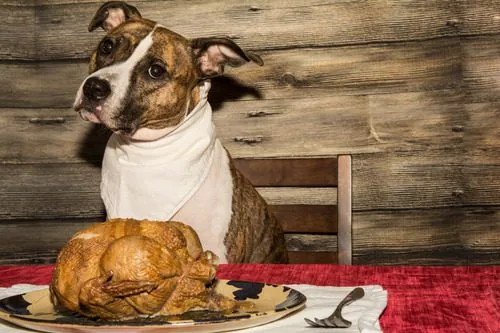Is it Safe for Dogs to Eat Turkey?
As the holiday season draws near, many of us look forward to a delicious turkey dinner. But as you prepare your meal, you might wonder, “Is it safe for dogs to eat turkey?” Before sharing this festive dish with your furry friend, you should take a moment to consider what’s safe and what to avoid to keep them healthy. At Warrick Veterinary Clinic, our knowledgeable team of veterinarians can provide recommendations for your pet’s ideal diet. Call us at (812) 897-4855 or request an appointment online today.

Is Turkey Good for Dogs?
The good news is that plain, cooked turkey can be a safe and nutritious treat for your dog. However, not all turkey is created equal when it comes to canine consumption. Let’s explore what types of turkey are safe and which should be kept off your pet’s plate.
Safe Ways to Serve Turkey to Your Dog
When offering turkey to your dog, simplicity is key:
- Unseasoned, Cooked Turkey: The best option is plain, boneless, and skinless turkey meat. It should be cooked without any seasoning, butter, garlic, onions, or other additives that can harm your dog.
- Moderate Portions: Even plain turkey should be served in small amounts. Overindulgence can lead to digestive issues or even pancreatitis, particularly if the meat is fatty.
Types of Turkey to Avoid
While turkey can be a healthy treat, certain parts and preparations are unsuitable for dogs:
- Turkey Skin: The skin is high in fat and often seasoned, which can upset your dog’s stomach or lead to more severe health issues.
- Cooked Turkey Bones: Cooked bones can splinter easily, posing risks such as choking, internal injuries, or blockages in your dog’s digestive system.
- Seasoned or Smoked Turkey: Turkey prepared with seasonings, especially those containing garlic or onion, should be avoided as these ingredients are toxic to dogs.
Why Cooked Bones Are Dangerous
Cooked turkey bones might seem like a natural treat for dogs, but they can be very hazardous. Cooked bones become brittle and can easily splinter, causing injuries to your dog’s mouth, throat, or digestive tract. Splinters or larger bone pieces can obstruct your dog’s airway, creating a potentially life-threatening situation. Ingested bone fragments can lead to blockages in the intestines, requiring immediate veterinary intervention.
What to Do If Your Dog Eats a Turkey Bone
If your dog accidentally consumes a turkey bone, act quickly but stay calm:
- Remove any remaining bones from the area to ensure your dog can’t access them and risk further harm.
- Watch for signs of distress, such as coughing, drooling, or vomiting. Contact Warrick Veterinary Clinic if any symptoms arise, as prompt care may be needed.
Safer Alternatives to Turkey Bones
Instead of giving your dog a turkey bone, consider these safer treats:
- Plain, Boneless Turkey: A small piece of unseasoned, cooked turkey is a safe option.
- Vegetable Treats: Plain, cooked vegetables like carrots or green beans are healthy and safe.
- Pumpkin: Canned pumpkin without added spices can be a nutritious treat that aids digestion.
- Commercial Dog Chews: Opt for chews designed to be safe and enjoyable for dogs.
How to Keep Your Dog Safe During Holiday Meals
To avoid any holiday mishaps, you can take a few precautions. Inform family and friends about what foods are safe for your dog and which to avoid. Keep leftovers and trash bags out of reach to prevent your dog from scavenging for potentially harmful scraps. Keep an eye on your dog during cooking and meal times to prevent accidental ingestion of unsafe foods. If you have any concerns about what your dog can safely eat, or if your dog has ingested something potentially harmful, contact Warrick Veterinary Clinic at (812) 897-4855 or request an appointment online.
